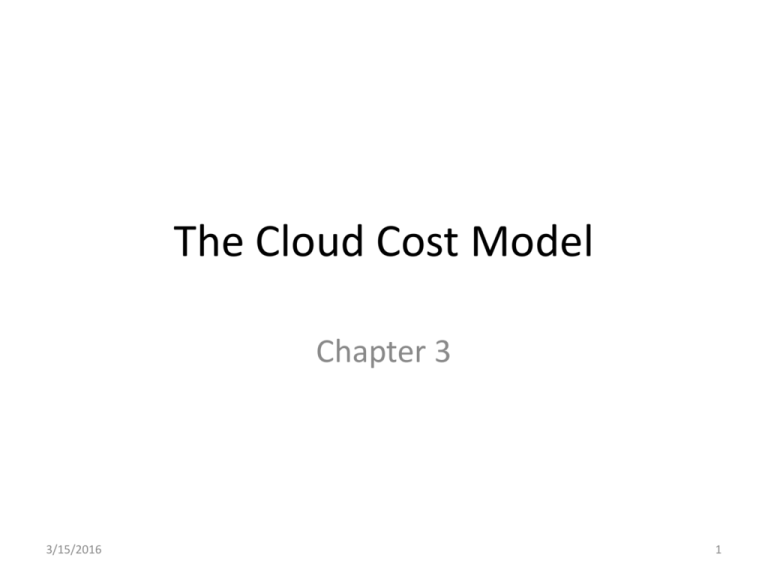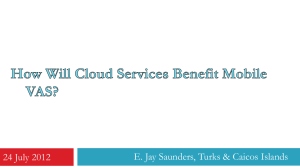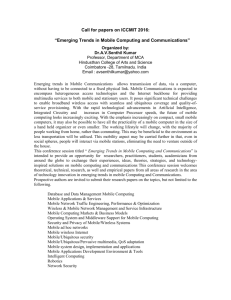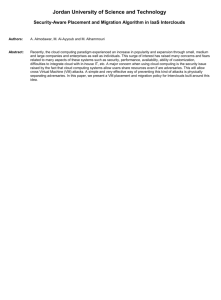The Cloud Cost Model
advertisement

The Cloud Cost Model Chapter 3 3/15/2016 1 AWS Account Activity $2498.42 3/15/2016 2 Account Activity Expanded 590 Hrs 50.15 96.66 3/15/2016 3 Software Licenses • Cloud environments come with costs bundled with the instances for the common operating systems and software packages: – Example: Windows, MySQL, Linux versions.. • Cloud is an impetus to work with freeware and open source. – Open source is ideal for the cloud – Flexibility of the open source made amazon cloud possible • Beyond, open source best licensing model is the one charges by CPU-hour • Amazon has recently introduced a feature where you can compute with licenses you purchased; bring your own license (BYOL) • Restricted software licenses are not good for cloud environment: – Per user licensing that requires validation against a server, auditing and such • Lesson: Make sure you understand the licensing for the products you use 3/15/2016 4 Simple Cost Model • 0.10 c per hour if you leave the Linux instance on: after 10 hours you terminate it, you pay $1.00 • http://aws.amazon.com/ec2/pricing/ • See also http://calculator.s3.amazonaws.com/calc5.html • On page 49: • 0.10/CPU-hour : one load balancer • 0.40/CPU-hour: 2 application servers • 0.80/CPU-hour: 2 database servers $2.40+ 44.00+38.40 = 84.80 per day for a typical scenario leading to $30,952 per year. This + software licenses (if you use yours) + management tools (cloud monitoring) + labor (who prepares and loads stuff on the cloud). 3/15/2016 5 A Sample Cloud ROI Analysis • Pages 51 -53 • Lets go over it. • On-demand instances let you pay for compute capacity by the hour with no long-term commitments. • This frees you from costs and complexities of planning, purchasing, and maintaining hardware and transforms what are commonly large fixed costs into much smaller variable cost. 3/15/2016 6 ROI contd. • Reserved Instances give you the option to make a one time payment for each instance you want to reserve and in turn receive a significant discount on the hourly usage charge for that instance. • Spot instances enable you to bid for unused Amazon Ec2 capacity. Instances are charged the Spot Price which is set by Amazon Ec2 and fluctuates periodically depending on the supply of and demand for Spot Instance capacity. 3/15/2016 7 Scenario 1 • Traditional: – Half rack at a reliable ISP with sufficient bandwidth to support your needs – Two good firewalls – One hardware load balancer – Two good GB Ethernet switches – Six solid, commodity business servers • The cloud option: – – – – One medium 32-bit instance Four large 64-bit during standard usage to meet peek demands Assume open source software and services Costs for time for setting up environments, monitoring services, labor for management of environment. • Table 3-1 gives the upfront and ongoing costs. 3/15/2016 8 Cost Analysis • Costs associated with different infrastructures (I – initial, M-Monthly) Internal-I Rack $3,000 Switches $2,000 Load balancer $20,000 Servers $24,000 Firewalls $3,000 24/7 Support $0 Mgt. software $0 Expected labor $1,200 Degraded.PERF $0 Totals $53,200 3/15/2016 Cloud-I Internal-M Cloud-M $0 $500 $0 $0 $0 $0 $0 $0 $73 $0 $0 $1,206 $0 $0 $0 $0 $0 $400 $0 $100 $730 $1,200 $1,200 $600 $0 $100 $0 $1,200 $1,900 $3009 9 Cost Comparison • 112,083 (internal) vs 94,452 (cloud) • When the traffic patterns are static and steady you may not need the cloud • Cost savings are tremendous when the variance between peak and average increases, and between average and low increases. • Excellent case: POP!World 3/15/2016 10 Service Levels for Cloud Applications • Cloud companies provide customers a services level agreement (SLA) that identifies key metrics (service levels) • The ability to understand and to fully trust the availability, reliability, and performance of the cloud is key conceptual block before moving into the cloud. 3/15/2016 11 Availability • a = (p – (c X d) ))/p where – a is the expected availability – c the % of likelihood that you will encounter a server loss in a given period – d expected downtime from the loss of the server – p the measurement period • If you have 40% chance of your server failing and it takes 24 hours to fix it, availability is: • (8760 –0.40X24)/8760 = 0.999 or 99.9% 3/15/2016 12 Availability (contd.) • Now consider other points of failures in the system: two cable outage in two hours • (8760 – ((0.4*24)+ (2.0*2)))/8760 = 99.84% • Redundancy mitigates this problem. When you have two or more physical components representing a logical component, the expected downtime of the logical component is the downtime of all the components down simultaneously • c X d now becomes (c X dn )/pn-1 • Applying this formula to a server with a duplicate we get 99.99% 3/15/2016 13 Availability in Amazon AWS • Amazon aws provides SLA for S3 and Ec2. • Other companies such as GoGrid and RackSpace are better. • Study the availability computation for a typical scenario. 3/15/2016 14 Summary • EC2 instances are much less stable than physical servers • The multiplicity of availability zones can mitigate lack of stability in an EC2 instance • Best way to improve infrastructure is to have spare parts lying around. In this respect cloud can help. How? 3/15/2016 15 Reliability • How well can you trust the system to protect data integrity and execute the requested operations. • Example 1: last class’s create key pair operation? What happened to my .pem file? • Example 2: I was preparing for this lecture, and my laptop hard drive failed deleting my presentation. • Data corruption is another reliability problem. • What if your instance goes down? Don’t store anything in the instance store. • Store your data in EBS and snapshot it frequently. 3/15/2016 16 Performance • Design your application so logic is spread across multiple servers • Use multi-threading to exploit multi-core in the underlying architecture • Clustering versus independent servers; a load balancer working with a set of independent nodes is better. • Mind your storage when considering performance: instance-store is unpredictable, EBS is fine, S3 is slow 3/15/2016 17 Security • Security issues: • Legal implications, regulatory constraints, standards, and compliance issues are different in the cloud • No perimeter security: you secure the traffic not the infrastructure • Cloud storage assumes high risk for exploits(unproven) • Virtualization solutions may have their own vulnerabilities. 3/15/2016 18 Disaster Recovery • Is the art of being able to resume normal systems operations when faced with a disaster scenario. • Cloud is an ideal solution for disaster recovery plans. 3/15/2016 19






